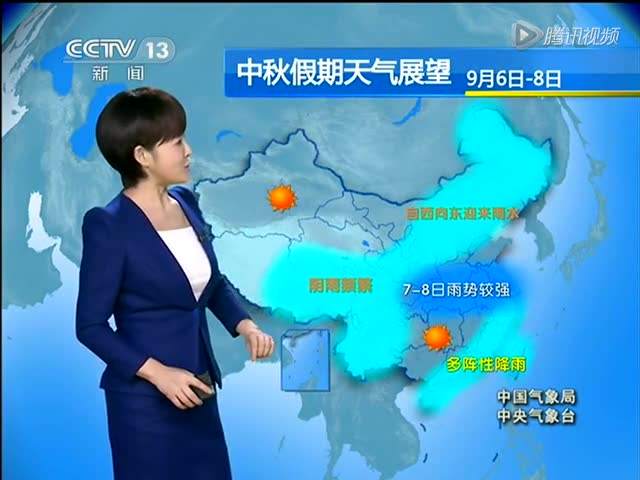


Screenshot of weather forecast on CCTV
As new technologies become increasingly popular in China, the nation is hoping to see more AI talents in weather forecast, which is a less a popular area compared to self-driving technology, but solves more down-to-earth problems.
The essence of weather forecasting is calculating millions of possibilities based on known meteorological conditions, said Zong Zhiping, deputy director of the National Meteorological Center of China Meteorological Administration.
“It’s a predictive science and it’s impossible to be 100% accurate,” Zong said. “To make weather forecasts more precise is a process of continuously narrowing the gap between calculations and reality. This is a difficult problem in our work,” he added.
AI provides a new solution. “Weather forecasting involves massive amounts of different types of space-time data, which is appropriate for AI,” said Chen Min, deputy director of CMA’s Institute of Urban Meteorology in Beijing. Chen believes that algorithms and supercomputers can provide quickly and automatically provide realistic results.
However, there is a talent shortage for AI talents in weather forecasting, as most AI jobseekers tend to look at fancier scenarios such as self-driving technology.
AI is already helping researchers to make far more precise forecasts of ordinary and regular weather conditions in China. In Beijing, AI helps with temperature forecasting, while Guangdong province uses AI to predict short-term immediate precipitation.
However, experts said that in some catastrophic, extreme, or transitional weather conditions, meteorology knowledge and accumulated forecasting experience from researchers is still needed to conduct the most accurate forecast.
 Fire brigade in Shanghai holds group wedding
Fire brigade in Shanghai holds group wedding Tourists enjoy ice sculptures in Datan Town, north China
Tourists enjoy ice sculptures in Datan Town, north China Sunset scenery of Dayan Pagoda in Xi'an
Sunset scenery of Dayan Pagoda in Xi'an Tourists have fun at scenic spot in Nanlong Town, NW China
Tourists have fun at scenic spot in Nanlong Town, NW China Harbin attracts tourists by making best use of ice in winter
Harbin attracts tourists by making best use of ice in winter In pics: FIS Alpine Ski Women's World Cup Slalom
In pics: FIS Alpine Ski Women's World Cup Slalom Black-necked cranes rest at reservoir in Lhunzhub County, Lhasa
Black-necked cranes rest at reservoir in Lhunzhub County, Lhasa China's FAST telescope will be available to foreign scientists in April
China's FAST telescope will be available to foreign scientists in April "She power" plays indispensable role in poverty alleviation
"She power" plays indispensable role in poverty alleviation Top 10 world news events of People's Daily in 2020
Top 10 world news events of People's Daily in 2020 Top 10 China news events of People's Daily in 2020
Top 10 China news events of People's Daily in 2020 Top 10 media buzzwords of 2020
Top 10 media buzzwords of 2020 Year-ender:10 major tourism stories of 2020
Year-ender:10 major tourism stories of 2020 No interference in Venezuelan issues
No interference in Venezuelan issues
 Biz prepares for trade spat
Biz prepares for trade spat
 Broadcasting Continent
Broadcasting Continent Australia wins Chinese CEOs as US loses
Australia wins Chinese CEOs as US loses